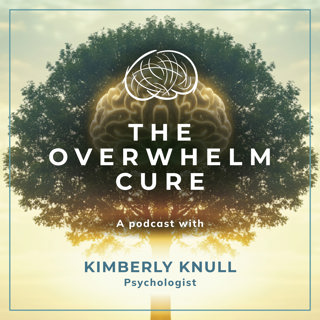
20: Imposter Syndrome Explained: Why It Happens & How to Beat It
When you're doing something new, have you ever felt like "everyone else knows more than me" or "I'm not really qualified for this?" This is imposter syndrome, and it's something that we all deal with at some point or another. It can be challenging, but I'm here to tell you that you're not alone, and we can work through it. In today's episode of The Overwhelm Cure, we're diving deep into imposter syndrome. I've been thinking a lot about this lately, and I really wanted to share some insights and strategies that have helped me tackle those feelings of not being good enough. Impostor syndrome is when you feel like you're not good enough, even though you've done well and achieved many things. You often doubt yourself, worry that others will find out you're not really capable, and think your success is just due to luck or outside help. You might still feel like a fraud despite a strong history of doing well. It's not a mental health disorder but a protective brain process that tries to get us to avoid things that might require a lot of energy and time. What you may choose to decide is that the effort is worth the future reward. 5 Key Takeaways: Imposter syndrome is common. Over 90% of people experience it. It's not a flaw — it's a protective mechanism our brain uses to try to save energy. It's not a mental health disorder. It's merely a feeling, a thought pattern. Recognizing that helps us separate our feelings from reality. We get to decide if we want to override it, which is empowering. Our brains tend to focus on weaknesses. Our brains have an innate negativity bias so we need to consciously remind ourselves of our strengths, accomplishments, and evidence of our capability. You don't need to be perfect — you only need to do your best. I share a story in this episode about Lorianne Menzer, the Olympic gold medalist who demonstrated what to do when things didn't go her way. Being kind and compassionate to yourself makes a world of difference. We're all learning and growing and being mean to ourselves is the worst strategy. 5 Practices to Try: Recognize the feeling of imposter syndrome. When you start feeling like an imposter, take a moment to acknowledge it and get curious about it. Challenge negative thoughts. Write down any fearful or negative thoughts and then find evidence that supports your past accomplishments. List your skills and strengths. Recite a mantra. I love Brene Brown's "courage over comfort." Say it to yourself when you're feeling anxious or uncertain about trying something new. Get support. Talk to someone you trust. Imagine people who believe in you are there cheering you on. Try tactical/box breathing. When you feel overwhelmed, breathe in for four counts, hold for four, breathe out for four, and hold for four. Repeat three to five times. Links: KimberlyKnull.com Timestamps: 00:00 Introduction to Imposter Syndrome 00:41 Personal Experience with Imposter Syndrome 02:31 Understanding Imposter Syndrome 11:09 Strategies to Overcome Imposter Syndrome 18:22 The Power of Mental Toughness 21:24 Embracing Self-Compassion 24:33 Conclusion and Final Thoughts
19 Touko 25min

19: Is It Time for Therapy? Understanding When to Reach Out for Help
Admitting I couldn't handle everything on my own felt like a huge step. Maybe you can relate? Today on The Overwhelm Cure, we're diving into something super important, and honestly, something I think we all wrestle with at some point: knowing when to seek professional support. I've had a lot of conversations lately, both with clients and in my own life, about feeling overwhelmed and unsure of where to turn. It got me thinking about how hard it can be to admit we need help and what that journey actually looks like. So, I thought it would be really helpful to break down some of those barriers we put up and talk about the incredible value of reaching out to a psychologist when things get tough for you. Action Steps: Recognize where you seem to be struggling on repeat Know that we're not meant to be perfect at everything You are the only one who knows when it's time to reach out for more support 5 Key Takeaways: It takes bravery to seek help, and acknowledging you need support is a sign of strength, not weakness. Many of us have the same fears and hesitations about therapy (they're very normal). You're not alone in how you feel. Therapy isn't about being "fixed" — it's about understanding your patterns and making choices that serve you better. You're the expert on YOUR experience, and if something is bothering YOU, it's worth exploring with a professional. Investing in your mental and emotional well-being is investing in your overall happiness and quality of life. 🔗 Resources The Gifts of Imperfection by Brené Brown If you're feeling stuck or overwhelmed, I encourage you to reach out — you can learn more about working with a trained psychologist — KimberlyKnull.com. Learn more about the upcoming Overwhelm Cure Program. Timestamps: 00:00 Introduction: The Importance of Seeking Help 00:25 Acknowledging the Courage to Seek Help 01:27 Recognizing the Signs You Need Support 02:56 Barriers to Seeking Therapy 04:53 The Role of Community and Connection 07:02 How Therapy and Group Programs Work 12:09 Realizations from Therapy 13:59 The Value of Professional Guidance 20:26 Conclusion: Taking the Next Step
12 Touko 20min

18: How To Stop Reacting and Start Responding
How easily are you triggered? I know for me, there have been moments where I've just felt completely overwhelmed, like I'm about to explode at the slightest thing. When I was deep in burnout, I remember when even my kids asking simple questions would send me over the edge. I HAD to figure out what was happening and how to cope. So, in this episode, you'll hear about what I've learned about identifying and managing those emotional triggers so you can respond intentionally. Key Takeaways Why recognising your triggers can help you react more mindfully Asking yourself at the end of the day how you reacted to the events of the day will give you important insights. Getting faster at noticing physical signs of stress can actually help ease your stress and overwhelm I hope this episode helps you take a step back, pause, and respond with intention instead of merely reacting. It's not always easy, but it's so worth it for the integrity and peace you'll feel. Links KimberlyKnull.com
5 Touko 18min

17. How to Break Free from Mom Guilt
In this episode, we delve into the pervasive feeling of mom guilt and explore practical strategies to stop feeling like we're constantly failing (no matter how hard we work!). We'll get to the root thoughts and habits that could be feeding the guilty feelings to help shift your mindset toward more peace, joy, and calm. This is important in helping us design a life with sustainable standards and becoming better role models for our kids. If you're struggling with mom guilt, get in touch for solutions that work — KimberlyKnull.com. Timestamps: 00:00 Managing Mom Guilt—An Introduction 00:46 The Daily Grind and Guilt 02:02 Unrealistic Expectations and Self-Pressure 02:30 A Day in the Life of an Overwhelmed Mom 04:10 The Pressure to Be Perfect 05:43 Challenging Unconscious Thoughts 06:30 Evaluating Time and Energy Spent 07:27 The Difficulty of Saying No 09:23 Reevaluating Beliefs and Setting Boundaries 21:07 Conclusion and Final Thoughts
28 Huhti 21min

16. Prioritizing What Matters and Putting Yourself First
Today, we're diving deep into something I've been chatting about with pretty much every single one of my clients lately — prioritizing ourselves and ditching the overcommittment. Is this a theme for your life lately? So, let's get real. How often do you want to say "no" but end up saying "yes" to everyone? Only to leave yourself feeling totally drained at the end of the day and wondering when you'll get to look after yourself. Yeah, I've been there—more times than I'd like to admit. I used to think that being busy meant being productive, but honestly, it just meant burning out. And trust me, burnout is no fun. In this episode of The Overwhelm Cure, I'm sharing ... How I finally learned to flip the script and start making decisions based on MY priorities How and why to figure out what truly matters to you Why identifying your top 3-5 priorities makes decision-making easier How to handle the challenge of saying no and letting go of the things that don't fit into your priorities Why it's not always easy, especially when we're wired to please others, but looking after your well-being is always worth it. You'll also hear some real-life examples, like how I used to handle a packed morning before a flight (spoiler alert: it wasn't pretty) and how I've shifted to put myself first. Listen, setting boundaries, even when it feels uncomfortable, is actually an act of self-care. Because, at the end of the day, you deserve to be on your priority list. When we put ourselves first, everything just seems to fall into place. Website: KimberlyKnull.com
21 Huhti 20min

15. How To Create Healthy Daily Routines To Reduce Stress and Overwhelm
🔁 "We are what we repeatedly do." - Aristotle. What do your daily habits look like? Those things that we do without even thinking about … Brushing our teeth Grabbing our phone Working out Did you know that mindfully choosing our habits can reduce stress and overwhelm? The key is choosing a handful of routines supporting physical and mental health. Changing everything all at once can contribute to overwhelm. But if we replace a not-so-good habit with a better one and then, bit by bit, add a new habit, change can feel effortless. Establishing routines helps us develop new habits that boost our health and wellness, reducing the mental drama and the resistance that often come with change. 🧠❤️ Routines create predictability, which our brains LOVE. But when there are no routines, or they're inconsistent, we can choose based on what feels good in the moment rather than what's best: five minutes, five hours, or even five days from now. If you've ever tried following a new meal plan, you know what I'm talking about. Motivation is great for getting us started, but we can run out of steam after just a few days. ▶️ Consistency is essential to achieving lasting change and guarantees our success in the long run. We often become set in our ways and feel obligated to repeat the same actions daily. Here's some good news → Just as we learned our current routines, we can also unlearn and relearn them. Here's a lesson my clients appreciate most 👉 Don't start what you don't want to stop. If you're starting a new healthy habit, it demands extra effort and planning. And it may take longer than you think it will. BUT… know that your persistence will help it stick. Eventually, it will become something you do with little effort, like brushing your teeth before bed. In this episode of The Overwhelm Cure podcast, you're getting a hefty dose of routine inspiration to help you create healthier habits both morning and night. They're super practical too — I think you'll love them! If you've been trying to change some routines and the mind drama doesn't seem to subside, get in touch. Website - kimberlyknull.com Timestamps: 00:00 Reducing Overwhelm with Habits 00:51 The Power of Small, Consistent Actions 02:48 Building Practical Routines 05:18 Overcoming Resistance and Cognitive Distortions 06:37 The Importance of Consistency 08:51 Evaluating and Adjusting Your Routines 12:55 Replacing Unhelpful Habits 16:00 Designing Your Morning Routine 20:06 Designing Your Evening Routine 28:39 Maintaining New Habits and Avoiding Backsliding
14 Huhti 31min

14. The Art of Saying No: Reclaiming Your Time with These 9 Scripts
How skilled are you at saying "no?" If you have people-pleasing tendencies, you might find it especially challenging to say yes to everything and everyone. This week, on The Overwhelm Cure, I'm exploring the reasons behind our hesitation to say no and what can happen when we're more focused on making others happy than looking after our priorities. Over the past two years, I've had some experiences with this, including turning down two lucrative CEO roles. In the end, I chose passion. Here's what you'll learn in this week's episode: The often-overlooked cost of overcommitting and stretching ourselves too thin My personal experience of declining two well-paying CEO positions How to view every "no" as a way of saying "yes" to your values — and really, yourself 9 scripts you can use today to practice saying "no" with grace Why just because you can do something doesn't mean you should I hope these scripts help you start saying yes to what matters most to you. To learn more and get support with saying "no" and strengthening your boundaries, get in touch at KimberlyKnull.com. Timestamps 00:00 Introduction: Reclaiming Your Time 00:46 The Cost of Overcommitting 01:23 Personal Experiences with Saying No 03:41 Designing a Life Aligned with Your Priorities 06:16 Choosing Passion over Money and Titles 11:05 The Cost of Overcommitting 14:33 Learning to Say "No" with Grace 23:29 Building Keystone Habits 28:51 Conclusion: Embracing Authenticity and Prioritize Yourself
7 Huhti 30min

13: Overcoming Overwhelm: The Art of Delegation and Asking for Help
Today, I'm talking about something that so many of us struggle with, especially women: the art of delegating and asking for help without feeling guilty. I had an experience the other day that really brought this lesson home for me. I think it might always be an area where I need to focus. Women are often socialized to believe that we need to do it all and be everything to everyone. Asking for help? That would be a sign of weakness. These ideas are only spinning us towards burnout — fast. Instead, I've learned that asking for help is a sign of strength, a way to strengthen relationships, and, ultimately, a simple way to take better care of ourselves. When we take better care of ourselves, we can show up for others. Here's what you'll learn in this episode: How societal expectations and childhood conditioning can lead to guilt when asking for help: Our worth is NOT tied to what we can do for others. Why change, even positive change, can make others uncomfortable and how to navigate that: You'll hear my insights on why people might respond negatively when we start setting boundaries and asking for help and how to stick to them even when others don't like it. Practical strategies to help you delegate without micromanaging: You'll get some actionable tips on clearly communicating your needs, trusting others to do their best, and letting go of perfectionism. The importance of reframing support as strength, not weakness: Asking for help isn't a failure. It's a way to build healthier relationships and look after ourselves. How to overcome the guilt that often comes with putting our needs first: You'll hear some simple mindset shifts and thought exercises that have helped me ask for support without feeling bad, because I know that I'm not being selfish. I hope this episode gives you the boost you need to start delegating, asking for help, and prioritizing your well-being without guilt. It takes practice — and it's so worth it. If you struggle with delegation at home or work, get in touch. Timestamps: 00:00 Introduction: Overcoming Overwhelm by Prioritization 00:32 The Societial Conditioning of Saying No 02:10 How Change Challenges Others 03:33 The Unsustainable Pursuit of Perfection 04:31 The Importance of Delegation 05:20 A Personal Example: Birthday Dinner Dilemma 10:29 Practical Tips for Effective Delegation 15:36 Overcoming Guilt and Embracing Support 18:59 Conclusion: A Manageable and Fulfilling Life
31 Maalis 19min





















